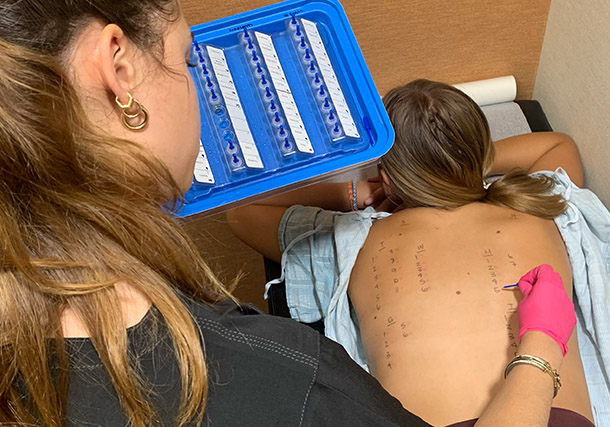
Allergy Testing in Charlotte
At Carolina Asthma & Allergy Center, we offer various types of allergy testing around Charlotte to determine what’s causing your allergic reactions. Our team of Board-Certified allergists is here to give you the best care possible, and help you return to a sense of normalcy. Whether you have seasonal allergies, food allergies, or other sensitivities, we’re here to help. We will guide you through the testing process, explain the results, and work with you to develop a personalized management plan that is both effective and convenient.
How to Request an Allergy Test Appointment
At Carolina Asthma and Allergy Center, we provide comprehensive evaluation and treatment for allergies, including allergy testing. If you suspect you may have an allergy or have experienced symptoms after exposure to certain substances, our team of board-certified allergists and experienced healthcare professionals can help.
To schedule an appointment, you can call our office or fill out the online appointment request form on our website. Our friendly staff will work with you to find a convenient date and time for your visit.
During your appointment, our allergists will carefully review your medical history, perform a thorough physical examination, and conduct relevant tests to determine the presence of an allergy. These tests may include skin prick testing, intradermal testing, RAST testing, or patch testing, depending on your specific needs.
Based on the evaluation results, our team will develop a personalized treatment plan to effectively manage your allergy symptoms and prevent future allergic reactions. Our goal is to provide you with the highest quality care and support in addressing your allergies, helping you lead a healthier and more comfortable life.
How Does Allergy Testing Work?
Allergy testing is a process that helps identify the specific triggers causing your allergic reactions. Simply put, allergies occur when the immune system overreacts to certain substances, like pollen or specific foods. To determine the most effective treatment approach, our team will work closely with you to pinpoint the exact cause of your allergic reactions. This involves administering a series of tests.
During allergy testing, small amounts of suspected allergens such as foods, pet dander, medications, or environmental substances are applied to your skin. Under the supervision of doctors, your skin’s reaction to these allergens is carefully observed. Through this process, our doctors can determine which substances are responsible for triggering your allergic reactions. With this information, we collaborate with you to create a personalized management plan that is both effective and convenient for your lifestyle.

How Do You Know if You Need an Allergy Test?
If you experience recurring or persistent symptoms that could be related to allergies, it may be beneficial to undergo an allergy test. Here are some signs that indicate you may benefit from an allergy test:
- Allergy Symptoms: If you frequently experience symptoms such as sneezing, nasal congestion, runny nose, itchy or watery eyes, coughing, wheezing, skin rashes, or hives, it could be a sign of allergies. Allergy testing can help identify the specific allergens triggering your symptoms.
- History of Allergies: If you have a known history of allergies, either personal or in your family, and you suspect that you are being exposed to allergens, an allergy test can provide confirmation and help determine the best course of action for managing your allergies.
- Unexplained Reactions: If you have experienced unexplained reactions, such as difficulty breathing, swelling, or hives, after exposure to certain substances like food, medications, or insect stings, an allergy test can help identify the culprit and guide preventive measures.
- Poor Response to Medications: If you have been using over-the-counter allergy medications or treatments but still find inadequate relief from your symptoms, an allergy test can help identify the specific triggers and guide more targeted and effective treatment options.
- Occupational or Environmental Exposures: If you suspect that your symptoms are related to certain occupational or environmental exposures, such as chemicals, dust, or animal dander, an allergy test can help confirm the specific allergens causing your reactions.
If you are unsure whether you need an allergy test, it is recommended that you consult with a healthcare professional, such as a board-certified allergist or an immunologist. They will evaluate your symptoms, medical history, and conduct a physical examination to determine if an allergy test is necessary. By identifying your specific allergens, you can develop a personalized management plan to reduce your exposure and effectively manage your allergies.
What are the Different Types of Allergy Testing?
At Carolina Asthma and Allergy Center, we offer various types of allergy tests to help identify the specific substances that trigger your allergic reactions. Our experienced team of healthcare professionals and board-certified allergists will determine the most appropriate testing method based on your individual needs. Here are some of the common types of allergy tests we may use:
- Skin Prick Test: This test, also known as percutaneous testing, involves applying small amounts of allergens to your skin and gently pricking or scratching the surface. If you are allergic to any of the substances, you may develop a localized reaction, such as redness or swelling.
- Intradermal Test: In this test, a small amount of allergen is injected just below the surface of your skin. This is typically done when the skin prick test results are inconclusive or when testing for specific allergies, such as insect venom or medications.
- Blood Test: Also known as a specific IgE blood test or RAST (radioallergosorbent) test, this test measures the level of allergen-specific antibodies in your blood. It can help determine your sensitivity to specific allergens and is often used when skin testing is not possible or inconclusive.
- Patch Test: This test is primarily used to diagnose contact allergies, such as allergies to metals, chemicals, or certain substances that come into contact with your skin. Small patches containing suspected allergens are applied to your skin and left in place for a specific duration to assess any allergic reactions.
Each type of allergy test has its advantages and disadvantages, and the choice of testing method will depend on your individual circumstances. The selection of the appropriate allergy test will depend on your medical history, symptoms, and suspected allergens. Our team will guide you through the testing process and ensure that you receive accurate and reliable results. Based on the test outcomes, we will develop a personalized treatment plan to manage your allergies effectively and improve your quality of life.
Summary
Allergy FAQs
How long does allergy testing take?
The length of time depends on the test used. Percutaneous and intradermal testing require about 15 minutes from the start of the test until the physician can read the results. Patch testing, which often detects environmental and occupational-related allergen exposures, usually lasts about two days.
Does insurance pay for allergy tests?
It depends on the policy. At Carolina Asthma & Allergy Center, we’re happy to help you navigate the insurance process. Prior to your visit, we will reach out to your insurance company to determine if your health insurance policy covers allergy testing and immunotherapy. We’ll create cost estimates to avoid any billing surprises for you when it’s time to make test or treatment decisions. Every step of the way, we support you in making a confident, educated decision about your care.
How do I know which kind of allergy test I need?
At Carolina Asthma & Allergy Center, we’re here to help you gain valuable insights into your allergies and take proactive steps towards managing them effectively. Contact one of our Charlotte area locations today to schedule your allergy testing appointment and embark on your journey to better health.



